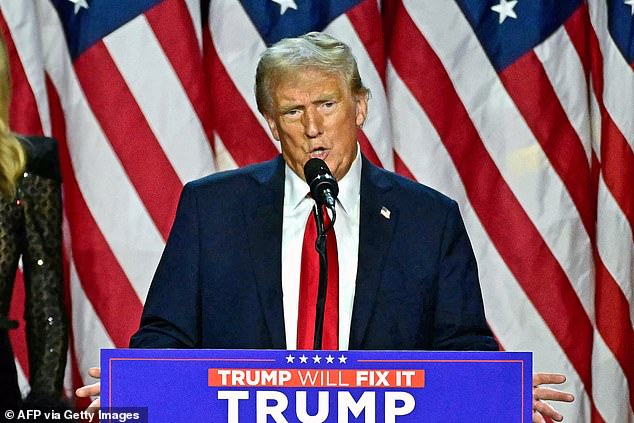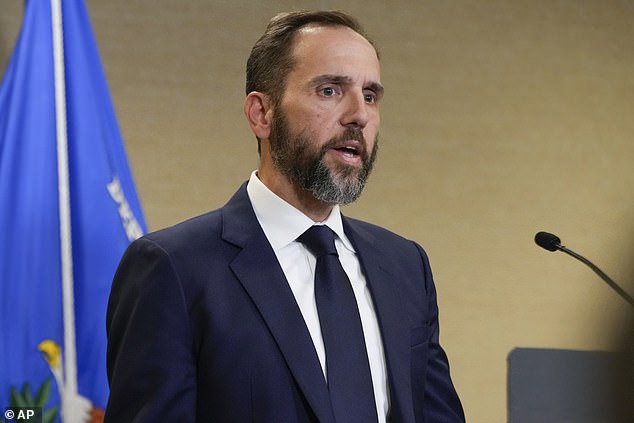The two federal criminal cases against Donald Trump are likely to conclude before he reaches the White House, according to reports hours after his landslide election victory over Kamala Harris.
Special prosecutor Jack Smith is in talks with the Justice Department to end the Jan. 6 and classified document prosecutions. NBC News reported.
The move would confirm that the Justice Department adheres to precedent that no sitting president can be prosecuted.
It’s a huge blow for Smith, who ramped up the cases in the final months of the campaign and has spent nearly three years and more than $35 million in taxpayer funds trying to bring the 78-year-old to trial.
Trump still faces sentencing in the hush money trial in New York next month and the election interference case in Georgia led by District Attorney Fani Wills has been plagued by a host of problems.
The two federal criminal cases against Donald Trump are likely to conclude before he reaches the White House, according to reports hours after his landslide election victory over Kamala Harris.
Trump faces four charges in federal court in Washington, accusing him of spreading false claims of voter fraud to try to block the collection and certification of votes following the 2020 election, which Trump lost to Democrat Joe Biden.
Trump asked federal courts to grant him presidential immunity, delaying the D.C. case for months, although the federal judge overseeing the case is still deciding how much Trump is actually covered by presidential immunity for his efforts to overturn his election loss. of 2020.
Since Trump will only be sworn into office on Inauguration Day, Jan. 20, prosecutors technically still have weeks to prosecute him if they wish.
But like previous efforts, they would be vulnerable to challenges and appeals.
‘The ball is in the court of the Department of Justice. “I think in the next 48 to 72 hours we’re going to hear something,” said a source close to Trump’s defense. “The Justice Department doesn’t want to be caught in a situation where they’re litigating something that doesn’t make sense.”
Smith had also accused Trump of illegally retaining classified documents at his Mar-a-Lago estate in Florida after his first term ended in 2021 and of obstructing the US government’s efforts to recover the records.
Florida-based U.S. District Judge Aileen Cannon, Trump’s nominee to the position, dismissed all charges in July after determining that Smith was improperly appointed to the position and did not have the authority to bring the case.
The ruling abruptly ended the case, ensuring that there would be no trial before the presidential election.
Smith’s team is appealing the ruling, but Trump’s promise to fire Smith “within two seconds” of taking office likely signals the end of the case.

Former President Donald Trump faced 88 criminal charges at the beginning of the year
But even if it were extended to the time Trump took office, it could shut him down.
Now that Republicans have taken control of the Senate, Trump is not expected to have difficulty confirming his Cabinet officials, and Sen. Marco Rubio (R-Fla.) has already signaled his mandate and said he deserves to bring in his own town.
The Justice Department’s actions come after a year of extraordinary legal developments, sparked in part by the Justice Department’s decision to take its time before filing charges.
Smith then launched a frantic effort to advance the cases on multiple fronts as election deadlines approached.
Trump took political advantage of the multiple prosecutions, arguing that he was a victim of “legal warfare” and “lunatic” prosecutors.
A key factor in the situation is a decades-old memo from the Justice Department’s Office of Legal Counsel.
“The Department concluded that impeachment or criminal prosecution of a sitting president would impermissibly undermine the ability of the executive branch to perform its duties under the Constitution,” he said.
It does not mention the presidential transition period, although Trump’s team maintains that the Presidential Transition Act lists presidential authorities that would provide the same protections.
Further strengthening Trump’s position is the Supreme Court’s decision in the Jan. 6 case that established presidential “immunity” from prosecution while in office, while lower courts are still analyzing what conduct is protected and what is not.


